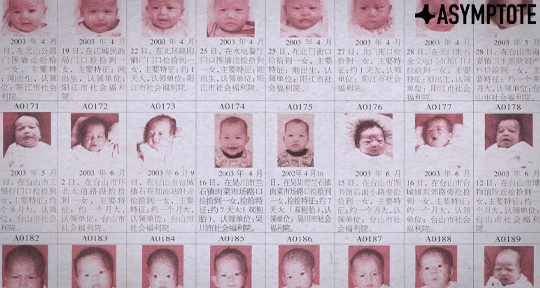The population control policies of China have been a long, treacherous trial of the invasion of nationhood into the most private corners of personhood. In the following essay, Xiao Yue Shan discusses the literature written under this continual interrogation, the performance of autobiography, and how the intensely personal can come to elucidate the immense.
Halfway through Nanfu Wang’s documentary, One Child Nation, the scale of China’s family planning policies begins to hint towards their true proportions—violence that moves past the triangulation of parent, child, and state, towards a vast chaos of capital and globalism. Following a series of tender but unequivocal interviews—in which the director confronts her own family’s trauma of child abandonment and death—Wang addresses the sensational story of a family who had made a living out of selling found children to orphanages, before being convicted and imprisoned for human trafficking. In an interview with the household’s late matriarch, she speaks without hesitation; the amount received for the first child she handed over was 700 RMB—about 115 USD. The camera, both attentive to and suspicious of her watery gaze, makes few observations of guilt or sorrow. She has that same discrepant, hard youth of many rural Chinese women, an aura of won stoicism and fearlessness, even as she relays the brutal details: “I was inconsolable . . . and the orphanage director [said]: ‘You found her? Her own family abandoned her. Why the fuck are you crying?’”
More Than One Child, a memoir by Shen Yang of “China’s Invisible Generation,” opens with an assertation of presence: “I have to say . . . how we lived. Otherwise, our entire generation really will be buried in the abyss of history.” This mythos of selfhood, in which one rises amongst many to speak as if chosen, is defined by the threat of absence. For a country that has perfected its weaponization of silence, even the sheer presence of an individual voice can be radical. Such is how the book makes its statement, a cover unignorably red in the hands, marking itself as necessary by underlining our fear of silence.
Born second to parents that would eventually go on to have four daughters in total, Shen Yang’s invisibility was a chronological certainty. Neither preciously firstborn nor the only excess child of her family, she recalls being first shuffled to the guardianship of doting grandparents, before the arrival of younger and younger sisters inevitably pushed her to the margins. In the tempestuous years of childhood, she moved through the households of extended family and through the dejections of neglect, ostracization, and loneliness. These trials, described in detail, are what compose the majority of her memoirs—episodes threaded with rage, resentment, and yearning scattered against the artless landscape of rural Henan.
It’s difficult to address Shen Yang’s memoir as a simple work of literature. The writing follows the natural misalignments of raw emotion, wavering with indignance and brashness; it feels much like looking at the mirror-image of oneself as a teenager, enraged by worldly injustices as refracted through the prism of selfhood. The aggrieved consciousness of a recklessly emerging identity pervades each recounting of hand-me-down clothing, schoolyard bullying, and corporal punishment. Explosive tantrums—on the part of both children and adults—populate the accounts, balanced out only by equally acrimonious memories of seething, silent hatred. All the players in this vicious game of attachments are intricated in the tenuous balance-game of reluctant, mutual reliances: heartless, cruel, and ugly. Even Shen Yang herself, fragile and explosive, is cast in a dejected shadow. Yet—how can it be otherwise? The text never proclaimed anything other than testimony. I have to say how we lived. The directive of truth-saying, of the voice as a passageway by which history travels, was there from its very beginning. The witness needs not be graceful—only believable. The truth is not the work of poets alone. READ MORE…

